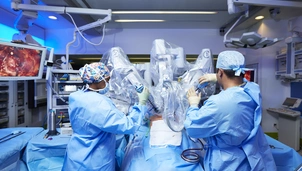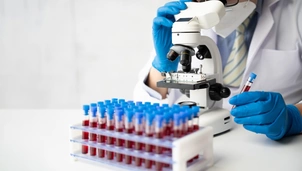Prostate cancer
Also known as: cancer of the prostate gland, prostate tumour
We offer a wide range of first-class diagnosis and treatment options for prostate cancer - one of the most common cancers in the UK.
What is prostate cancer?
The prostate is a walnut-sized gland that’s located at the base of the bladder in men.
Prostate cancer develops when cells in the prostate become abnormal and multiply.In the early stages of prostate cancer the lump of cells often grows slowly, but it can become bigger and start to spread.
These tumours need treatment to prevent the cancer from moving beyond the prostate to other parts of the body. If the cancer does become bigger and spread, it may make you feel unwell and unable to live life as you used to.
What are the causes of prostate cancer?
The causes of prostate cancer are largely unknown, but there are certain risk factors that can increase your chances of developing prostate cancer. For example:
Age
Prostate cancer usually affects people over 50 and the risk increases with age.
Family history
People whose close family members have had prostate or breast cancer have an increased risk of the illness.
Ethnicity
Prostate cancer is more common in people of African-Caribbean or African descent, and less common in people from Asia.
Obesity
People with a high body mass index (BMI) are more vulnerable to prostate cancer.
Despite these risks listed above, people of all ages, backgrounds and sizes can get prostate cancer.
If you notice any concerning symptoms, it’s important to seek medical assessment and advice.
What are the signs and symptoms of prostate cancer?
In the early stages of prostate cancer, there may be no symptoms at all, but as the tumour grows, it can affect your ability to urinate.
Signs and symptoms to look out for include:
- Finding it hard to start urinating
- A weak stream of urine and dribbling afterwards
- An increased need to urinate
- Getting up at night more often to go to urinate
- An urgent need to urinate
- Incontinence and leakage of urine
- The feeling that you’re not fully emptying your bladder
If the cancer spreads outside the prostate, there may be further symptoms, including:
- Blood in your urine or semen
- Problems getting an erection
- Unexplained weight loss
- Loss of appetite
- Pain in your bones
Many people think these symptoms are part of getting older, but they’re not. They could be signs of less serious conditions, but it’s better to have a check-up to exclude prostate cancer and get the treatment you need.
How is prostate cancer diagnosed?
In our warm and welcoming Duchess of Devonshire Wing, we offer a range of tests to diagnose and detect prostate cancer quickly.
If you have any symptoms or wish to have a screening blood test or examination, contact us today to make an appointment.
Our expert urologists can usually diagnose cancers by examining you and testing your blood. This may be followed by a scan and tissue sample (biopsy) if there are any signs there is prostate cancer.
Blood test for prostate specific antigen (PSA)
PSA is a protein produced by the prostate gland and all forms of prostate disease create high levels of it.
MRI scan
We have a state-of-the-art imaging department with specialists who are experts at creating and interpreting detailed MRI scans of inside the body.
Prostate biopsy
A fine needle is used to take tissue from the prostate gland and our world-class pathologists then check for cancer cells.
How is prostate cancer treated?
Prostate cancer treatment is an area in which The London Clinic excels.
Our priority is to provide you with the very best and latest treatments, as well as outstanding personalised care.
The right treatment for prostate cancer will depend on the size and stage of the cancer and your age and general health.
Observation and monitoring
If you’re diagnosed with a small, early prostate cancer, your consultant may recommend that it’s watched carefully rather than actively treated.
If the prostate cancer is more aggressive and still within the prostate, there are a number of options available.
Radical prostatectomy
A radical prostatectomy is a type of surgery involving the removal of the prostate and the cancer cells within the area.
The London Clinic was the first private hospital in the UK to carry out a radical prostatectomy using cutting-edge robotic surgery.
This form of keyhole surgery allows our renowned surgeons to operate on the prostate with greater accuracy, leading to fewer side effects and complications.
External beam radiotherapy
External beam radiotherapy uses high-energy X-ray radiation that is directed at the prostate gland, which destroys the cancer cells and stops them from spreading and growing.
Permanent seed brachytherapy
Permanent seed brachytherapy uses tiny radioactive seeds that are placed into the prostate gland. These stay there for a number of months, giving off a steady, low-dose of radiotherapy that kills cancer cells.
High-intensity focused ultrasound
High-intensity ultrasound uses high-frequency sound waves to destroy cancer cells in the prostate.
A beam of ultrasound energy travels into the prostate from a probe put into the back passage (rectum).
Cryotherapy
Cryotherapy is a treatment that uses extreme cold to freeze and destroy cancer cells. Depending on the size of the cancer and where it’s located, the whole prostate or part of it may be treated.
Stereotactic ablative body radiosurgery (SABR)
Stereotactic ablative body radiosurgery (SABR) is an incredibly precise procedure that uses a machine called a CyberKnife.
Highly focused beams of radiation are used to destroy the cancer while causing minimal damage to surrounding healthy tissue.
If the cancer has spread outside the prostate gland, a combination of treatments can be used. This can help control symptoms, and slow down the growth and spread of the cancer and maintain your quality of life.
Hormone therapy
The male hormone testosterone drives the growth of prostate cancer cells.
Hormone therapy medications such as abiraterone and enzalutamide stop your body from making testosterone, or stop testosterone from reaching cancer cells.
This type of therapy won’t cure your cancer, but it can be effective at shrinking tumours and slowing the growth of cancer as part of your overall treatment plan.
Chemotherapy
After certain treatments, we can use different combinations of chemotherapy to prevent the remaining cancer cells from dividing and spreading.
Lutetium-177 PSMA therapy
At The London Clinic, we also offer an innovative molecular therapy called lutetium-177 PSMA therapy, for people that have advanced prostate cancer.
Your consultant may recommend it if you’ve already had hormonal therapy or chemotherapy.
Advanced prostate cancer (metastatic prostate cancer) is a cancer that’s spread from the prostate to other parts of the body, and most commonly the bones.
Lutetium-177 PSMA is an innovative new treatment that involves a special radioactive medication being injected into your bloodstream.
Once inside the body, the medication seeks out prostate cancer cells and gives them a high dose of radiation to kill them.




















